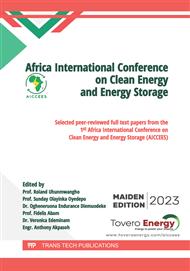[1]
Bernard Aboagye, Samuel Gyamfi, Eric Antwi Ofosu, and Sinisa Djordjevic. Status of renewable energy resources for electricity supply in Ghana. Scientific African, 11:e00660, 2021.
DOI: 10.1016/j.sciaf.2020.e00660
Google Scholar
[2]
Eric Abokyi, Paul Appiah-Konadu, Isaiah Sikayena, Eric F Oteng-Abayie, et al. Consump- tion of electricity and industrial growth in the case of Ghana. Journal of Energy, 2018, 2018.
DOI: 10.1155/2018/8924835
Google Scholar
[3]
Theophilus Acheampong, Bridget Okyerebea Menyeh, and Doris Edem Agbevivi. Ghana's changing electricity supply mix and tariff pricing regime: implications for the energy trilemma. Oil, gas and energy law, 19(3), 2021.
Google Scholar
[4]
Philip Kofi Adom. Electricity consumption-economic growth nexus: the Ghanaian case. International Journal of Energy Economics and Policy, 1(1):18–31, 2011.
Google Scholar
[5]
Aaron Yaw Ahali. Improving electricity access in Ghana challenges and the way forward. International Journal of Energy and Power Engineering, 5(2-2):9–17, 2016.
DOI: 10.11648/j.ijepe.s.2016050202.12
Google Scholar
[6]
Peter Ansu-Mensah and Paul Adjei Kwakwa. Modelling electricity consumption in Ghana: the role of financial development indicators. Green Finance, 4(1):54–70, 2022.
DOI: 10.3934/gf.2022003
Google Scholar
[7]
World Bank. World Development Indicators,https://databank.worldbank.org/source/world- development-indicators. World Bank, Washington DC, 2021.
DOI: 10.1596/26447
Google Scholar
[8]
Ghana Energy Commission et al. National energy statistics, 2000–2019. Ghana Energy Commission: Accra, Ghana, 2020.
DOI: 10.19070/2326-3350-1300014
Google Scholar
[9]
Felix Amankwah Diawuo, Ian J Scott, Patricia C Baptista, and Carlos A Silva. Assessing the costs of contributing to climate change targets in sub-saharan africa: The case of the ghanaian electricity system. Energy for Sustainable Development, 57:32–47, 2020.
DOI: 10.1016/j.esd.2020.05.001
Google Scholar
[10]
Patrick Enu and Emmanuel Dodzi Kutor Havi. Influence of electricity consumption on economic growth in Ghana. Int. J. Econ. Commer. Manag, pages 1–20, 2014.
Google Scholar
[11]
Eric Osei Essandoh, Gilbert Ayine Akolgo, Ebenezer Nyarko Kumi, and Thomas Atta- Darkwa. Review and analysis of Ghana's power sector policies, programmes and reforms. Journal of Energy and Natural Resource Management, 7(1), 2021.
Google Scholar
[12]
YH Fung and VM Rao Tummala. Forecasting of electricity consumption: a comparative analysis of regression and artificial neural network models. In 1993 2nd International Con- ference on Advances in Power System Control, Operation and Management, APSCOM-93., pages 782–787. IET, 1993.
Google Scholar
[13]
Jesús Enrique García Guiliany, Emiro De-La-Hoz-Franco, Andrés David Rodríguez Toscano, Juan David De la Hoz Hernández, and Hugo G Hernandez-Palma. Multiple linear regression model applied to the projection of electricity demand in colombia. 2019.
DOI: 10.32479/ijeep.7813
Google Scholar
[14]
World Bank. Information, Communication Technologies, and infoDev (Program). Informa- tion and communications for development 2012: Maximizing mobile. World Bank Publica- tions, 2012.
Google Scholar
[15]
Emmanuel Kwadzo Katani. Forecasting the total energy consumption in Ghana using grey models. Grey systems: theory and application, 9(4):488–501, 2019.
DOI: 10.1108/gs-05-2019-0012
Google Scholar
[16]
Francis Kemausuor and Emmanuel Ackom. Toward universal electrification in Ghana. Wiley interdisciplinary reviews: energy and environment, 6(1):e225, 2017.
DOI: 10.1002/wene.225
Google Scholar
[17]
Rogers Kipkoech, Mohammed Takase, and Ernest Kofi Amankwa Afrifa. Renewable energies in Ghana in relation to market condition, the environment, and food security. Journal of Renewable Energy, 2022:1–8, 2022.
DOI: 10.1155/2022/8243904
Google Scholar
[18]
Catherine Kuamoah. Renewable energy deployment in Ghana: the hype, hope and reality. Insight on Africa, 12(1):45–64, 2020.
DOI: 10.1177/0975087819898581
Google Scholar
[19]
Ebenezer Nyarko Kumi. The electricity situation in Ghana: Challenges and opportunities. Center for Global Development Washington, DC, 2017.
Google Scholar
[20]
Paul Adjei Kwakwa, Solomon Aboagye, et al. Energy consumption in Ghana and the story of economic growth, industrialization, trade openness and urbanization. Asian Bulletin of Energy Economics and Technology, 1(1):1–5, 2014.
Google Scholar
[21]
XQ Liu, BW Ang, and TN Goh. Forecasting of electricity consumption: a comparison between an econometric model and a neural network model. In [Proceedings] 1991 IEEE International Joint Conference on Neural Networks, pages 1254–1259. IEEE, 1991.
DOI: 10.1109/ijcnn.1991.170569
Google Scholar
[22]
Gifty Serwaa Mensah, Francis Kemausuor, and Abeeku Brew-Hammond. Energy access indicators and trends in Ghana. Renewable and Sustainable Energy Reviews, 30:317–323, 2014.
DOI: 10.1016/j.rser.2013.10.032
Google Scholar
[23]
Justice Tei Mensah and George Adu. An empirical analysis of household energy choice in ghana. Renewable and Sustainable Energy Reviews, 51:1402–1411, 2015.
DOI: 10.1016/j.rser.2015.07.050
Google Scholar
[24]
Zaid Mohamed and Pat Bodger. Forecasting electricity consumption in new zealand using economic and demographic variables. Energy, 30(10):1833–1843, 2005.
DOI: 10.1016/j.energy.2004.08.012
Google Scholar
[25]
Douglas C Montgomery, Elizabeth A Peck, and G Geoffrey Vining. Introduction to linear regression analysis. John Wiley & Sons, 2021.
Google Scholar
[26]
Raymond H Myers, Douglas C Montgomery, G Geoffrey Vining, and Timothy J Robinson. Generalized linear models: with applications in engineering and the sciences. John Wiley & Sons, 2012.
DOI: 10.1111/j.1751-5823.2010.00122_26.x
Google Scholar
[27]
Karl Pearson. Vii. mathematical contributions to the theory of evolution.—iii. regression, heredity, and panmixia. Philosophical Transactions of the Royal Society of London. Series A, containing papers of a mathematical or physical character, (187):253–318, 1896.
DOI: 10.1098/rsta.1896.0007
Google Scholar
[28]
Amal Rahmane. Reality and prospect of electricity production from renewable energies in arab countries. In Reality and prospect of electricity production from renewable energies in Arab countries: Rahmane, Amal. 2018.
DOI: 10.1002/9781119866107.ch1
Google Scholar
[29]
Kelly H Zou, Kemal Tuncali, and Stuart G Silverman. Correlation and simple linear regres- sion. Radiology, 227(3):617–628, 2003.
DOI: 10.1148/radiol.2273011499
Google Scholar


